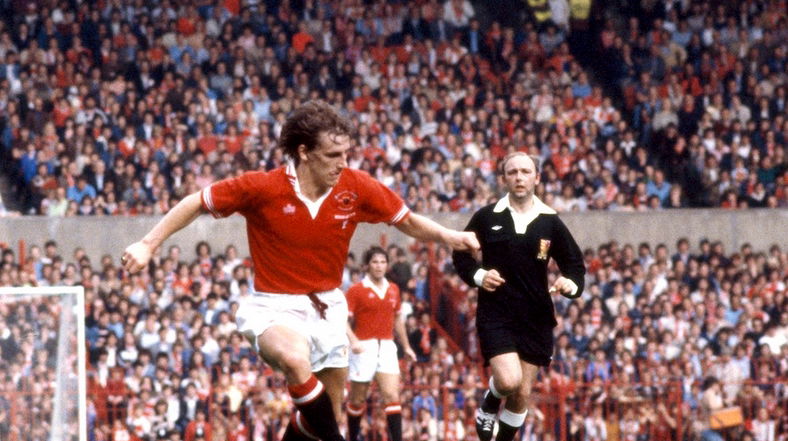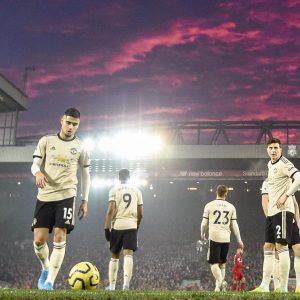
Steve Coppell – Mr Consistency
With it being sandwiched in between the glorious eras of Sir Matt Busby in the 1960s and Sir Alex Ferguson from the late 80s, the 1970s are often a forgotten decade in the history of Manchester United. With the slow decline of Busby’s European Cup winning side of 1968 culminating in relegation to the Second Division in 1974, it is easy to see why it isn’t a prominent period in the club’s proud history.
But the 1970s was so much more than a decade the supporters would rather forget about. It was a time which saw the regeneration of the club which was waning in the darkness of Sir Matt Busby’s shadow. Relegation was obviously a disaster at the time, especially as it arrived just six years after United were crowned European champions, but in the long term it may have been a blessing in disguise.
The demotion to the second tier of English football allowed the club to start over again. Gone were the trinity of Bobby Charlton, Denis Law and George Best. It was time for a new set of heroes, a new team to come to the fore. Tommy Docherty could build his own side, one capable of not only returning to the top division but also able to challenge for major honours in the future.
Although the seventies did bring considerable success, the impact of that decade meant much more than the cups put in the trophy cabinet. It has taken hindsight to see it but that period arguably laid the foundations for an era of unprecedented glory under Sir Alex Ferguson. Were it not for what happened in that time, Manchester United might well have still been wandering in the wilderness, still dreaming of reliving former glories achieved in yesteryear.
Many players were the heroes of the seventies, many great names thrilled the Old Trafford crowd. Tommy Docherty built an exciting young team which could rival the great entertainers of the 1940s, fifties and sixties. Steve Coppell was one of the brightest and most consistent talents in that brilliant side of the seventies.
When thinking of the great wingers in keeping with tradition at Manchester United, Steve Coppell deserves a place amongst the finest wide men to have hugged the Old Trafford touchline. And there have been fewer more consistent performers to have pulled on a United shirt.
Coppell began his career at his Tranmere Rovers, despite interest coming from bigger clubs, as he was planning to study economic history at the University of Liverpool. He wasn’t only at Tranmere to complete his degree and performed well, scoring thirteen goals in thirty-eight appearances. In 1975, he was persuaded to leave Prenton Park and join United in a £60,000 deal.
He made his debut for his new club in the 4-0 victory of Cardiff City in March 1975. He managed to play nine more games, scoring once, as Docherty’s side returned to the top flight at the first attempt.
Manchester United had been reborn under the ‘Doc’s’ management and the following season, 1975/76, Steve Coppell emerged as a key member of one of the most loved and highly regarded team in the club’s history. He made thirty-nine appearances that year, scoring an impressive ten goals, as the team finished in third place in their first season back in the top flight. They also demonstrated their progress by reaching the 1976 FA Cup final. Coppell’s first appearance in the prestigious final was to end in disappointment though as an experienced Southampton, albeit in the Second Division, secured a surprise 1-0 win at Wembley.
Tommy Docherty famously told supporters after the defeat to Southampton “that we would be back the next year to win the cup”, and his words proved prophetic as the side returned to Wembley in 1977. Coppell later admitted to being in awe of the occasion the previous year but realised, too late, what the game meant. “I didn’t feel too bad, as I appreciated being in the FA Cup final at all. It was only afterwards I realised it might have been the only chance I’d ever get. But the next season gave me another go.” This time a dominant Liverpool side bidding to win the treble were the opponents. However the Merseysiders’ dreams of completing such a feat were dashed by Coppell and United under the Twin Towers of Wembley.
The 1977 FA Cup was Coppell’s first major honour and, disappointingly for a player of such quality, it was to be his last. The dismissal of Tommy Docherty shortly after the cup triumph possibly halted United’s progress to returning to the game’s elite and Coppell was part of many teams chasing an elusive league title.
They came close to winning more honours but fell short at the final hurdle. Coppell held another FA Cup runners-up medal in 1979 after losing to Arsenal. Alan Sunderland’s winning goal capped one of the most incredible endings to a cup final ever seen. At one point United were 2-0 down but restored parity in the final minutes, their equaliser coming through a delightful chipped pass from Coppell which Sammy McIlroy dispatched. The winger later said of the game that he “had a vision in my head that we would win 4–2 in extra-time”. Sunderland’s dramatic winner saw his hopes ended.
Steve Coppell was the model of consistency as a professional footballer. Such form saw him earn his first England cap in 1977 and he would go on to play forty-two times for his country and score seven goals. He appeared in the 1980 European Championships and the 1982 World Cup. It was with the national side that he suffered the injury which effectively ended his career.
The injury occurred in a 1982 World Cup qualifier against Hungary. A terrible high challenge left Coppell with a shattered knee which he later described as “like someone had put a firework in my knee and it had gone off”. He underwent an operation which allowed him to continue his career but it wasn’t to be long before it had to be brought to a premature end.
He continued playing for United and again suffered cup final heartbreak, this time in the League Cup where Liverpool gained a measure of revenge for 1977 by winning 2-1. That year, 1983, Ron Atkinson’s side also reached the FA Cup final but a recurrence of his knee problem ruled Coppell out of the victory.
In October 1983, after another operation, Steve Coppell was forced to call time on his football career at the age of just 28. Perhaps he will look back on his career with a sense of disappointment. One winner’s medal is scant reward for such a wonderful performer. But he was a vital part of the exciting side which helped rebuild Manchester United. He made a remarkable 207 consecutive appearances, between 1977 and 1981, a record which stands to this day. In all he played 373 times for United, scoring 70 goals. Mr. Consistent will always be a tag which Steve Coppell is labelled with, and rightly so, but don’t let it detract from the superb quality which he possessed.
Of the many brilliant wingers, and players, to have played for Manchester United, Steve Coppell can be held in regard with the best of them.














